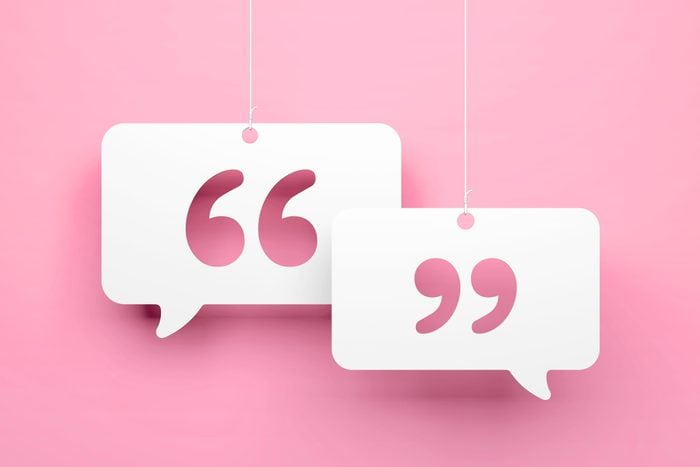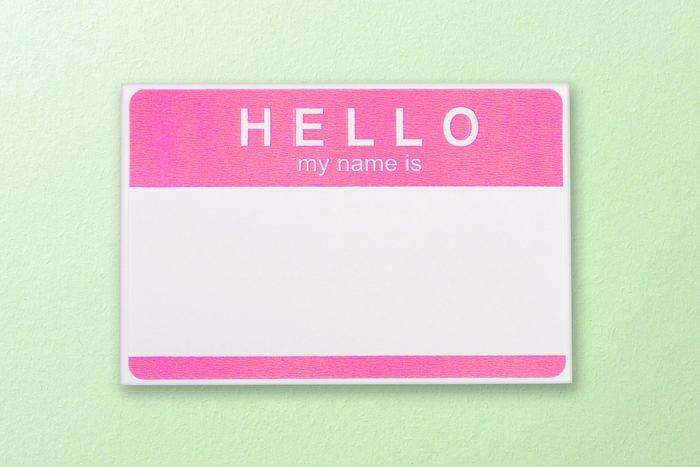
Master the art of small talk
People who know me are well aware that I’m good at small talk. The nickname “Chatty Cathy” has been thrown around many, many times in my life, and as a reporter, I talk with strangers for a living. A dear friend used to joke that I could talk to a tree stump. I have no doubt that I could—and I’d probably enjoy it.
I learned the art of friendly chit-chat from the best. My dad was a genius at small-talk etiquette. He instinctively knew how to draw strangers in, make them feel interesting and heard, yet deftly avoid any topics that could bore or offend. It’s my casual observation that Midwesterners—my native home—are particularly adept at this skill. It’s a combination of inherent friendliness and politeness that many of us seem to be born with. After he retired, my father kept a tub of dog biscuits in his garage for the neighbors who were walking by with their pups. In no time, there was a daily parade of people and pets dropping in to say hello.
If striking up a conversation isn’t your birthright, it’s a simple skill to begin learning. In fact, it’s a key to learning how to be smarter—developing interpersonal intelligence means reading social cues, showing empathy and interacting effectively with others. And it can all start with small talk. Here are some sound pieces of advice from experts (and some of my Midwestern childhood friends) on how to talk to anyone.
Get Reader’s Digest’s Read Up newsletter for etiquette, humor, cleaning, travel, tech and fun facts all week long.
What is small talk?
Small talk is mostly the ability to maintain a friendly and light-hearted conversation with strangers or someone you don’t know very well. But it can be so much more than that, and it makes small talk more fun if you believe that a conversation could prove exciting, educational and meaningful.
“Small talk is the appetizer for a relationship,” says keynote speaker Debra Fine, author of The Fine Art of Small Talk. So all that chatting about sports and streaming television is really just the ice-breaker for something that can become more substantial.
Fine says that she can tell right away when she meets someone whether there’s a friendship connection there, which can lead to more rewarding conversations down the road. So how can you master the art of small talk? It’s more than repeating conversation starters. These are the small-talk basics you need to know.

1. Say your name and repeat theirs
Don’t sweat it if you’re not good at remembering things, including names. “A person’s name is to that person the sweetest and most important sound in any language,” Dale Carnegie wrote in his 1937 classic How to Win Friends and Influence People. This advice still rings true. Start a conversation with a strong and friendly introduction, like “Hi, my name is Cathy. What’s yours?” When the person responds, repeat their name back. If it sticks in your brain, great. If it doesn’t, at least you made a polite first impression.
2. Focus on them, not you
My high school friend Laura drove for a ride-share company for a few years. (If anyone knows how to read people and make small talk, it would be the ones who drive strangers around town for a living.) Here’s the gem she told me: “Ask questions and listen intently, so you can ask follow-up questions, even if it’s just ‘Tell me more about that.’ You don’t have to talk much when you keep the conversation focused on them, and they’ll walk away feeling like you really cared.”
3. Find common ground
My grade-school buddy Link was a missionary after college and now works as a hydrologist for the National Weather Service—the mother of all small-talk conversations, but I digress. He says that when you’re launching into a conversation with someone you don’t know very well, poke around for something you have in common.
“Find anything, even small, that genuinely interests you about that person and then talk about it,” he says. “You see they drive a Jeep and your dad had a Jeep, so you compare notes. Or they’re wearing cowboy boots and you kinda wish you had a pair, so you ask about them. For me, I know (and am interested in) different places and cities, so I always like asking about [where] they’re from.” Look at it as a friendly way to learn something new every day.

4. Resist the impulse to be a “matchmaker”
And by this, I don’t mean pairing off friends who are looking for love. Fine says matchmaking is when you have to respond to everything a person says with your own version of the same thing. So if someone says they just traveled to Florence, don’t immediately launch into a lengthy monologue about your own recent trip to Rome. It’s fine to bond over shared experiences, but Fine says you should hold your tongue for a bit. “Share your commonalities five minutes into the conversation to give them a chance to talk about themselves,” she says. It’s this kind of emotional intelligence that can keep a conversation rolling.
5. Don’t offer advice if they didn’t ask for it
Sometimes, a neighbor just wants to chat about the flowers in his garden without being told he should’ve planted something else. Or a friend of a friend needs to get something off her chest about problems at work. “If she wants to leave that job, she doesn’t need your unsolicited advice,” says Fine. Learn how to focus on and acknowledge what you’re hearing, show a little empathy and don’t try to solve their problems. “If someone wants help, they’ll usually reach out and ask,” Fine says.

6. Don’t monopolize the conversation
Do you consider yourself self-aware? Fine says most of us don’t think we’re hogging the convo, when we very much are. It’s natural to blather on from time to time about what’s going on in your life, but “don’t talk about yourself for more than three or four minutes,” says Fine. “Then take the conversation ball and throw it back.”
If your gut instinct is that you’re being too long-winded about minute details of your life, then you probably are. Remember, asking questions—and listening to the answers—is one of the secrets of success for good small talkers.
7. Treat the conversation like it matters
An acquaintance of mine, Ellen Jovin, talks with strangers almost every day. She is the creator of the Grammar Table, a pop-up grammar advice stand that has her fielding questions in urban areas across the United States. I love what she has to say about small talk: “My view is that there is no such thing as small talk,” she says. “Yes, I may be talking about focused topics with minimal global impact—from the weather to a tree to a semicolon—but the talk is not small to me, ever.”
She says there are multiple layers of meaning and connection in all topics. “That’s part of why I love talking to strangers so much!” Jovin says. “If someone can’t think of anything to talk about, I say, ‘Would you like me to ask you a question?’ The answer is yes a very high percentage of the time, maybe 90%.”

8. Do your homework
This tip is particularly important for the inevitable small talk that happens at the start of a job interview. If you have a chance to dig around about a potential employer you’ll soon be chatting with, take it. “I like to look for their LinkedIn profile and find something I can use to greet them, like where they’ve lived, where they may have gone to school, where they’ve worked or currently work,” says Ben Warner, a personal financial representative for Allstate in Overland Park, Kansas. “There is always an element of that information that can be threaded into a warm greeting and initial icebreaking conversation.” And that goes a long way toward making the conversation a little less awkward.
9. Steer clear of controversial topics
If the past few years of American politics have taught us anything, it’s that it’s best to keep that subject off limits in polite company. My junior high school best friend Kelly is a liberal mother and activist in a bright red state, and she often finds herself in the company of people she strongly disagrees with. “Some of them have probably received multiple letters from me as a constituent,” she jokes.
In those situations, she tries to keep the small talk around the topic that brought everyone together in the first place. Maybe it’s because your kids are all playing soccer, you’re at a friend’s birthday party or you’re at a library fundraiser. “My hope is to create a connection with the person, so that if we have to engage on something we have differing opinions on, I can build on what we can agree on,” she says.
10. Plan an exit strategy
Every conversation needs to come to a natural conclusion, but sometimes, one of the people doesn’t realize that. Fine has some next-level advice on this: “Say you need to grab a cup of coffee. Say you need to chat with a client you see across the room. Whatever the excuse is, you need to do what you say you’re going to do,” she says. So if you part ways saying that you need to use the loo, don’t walk over to the catering table and stuff your face in plain sight for 15 minutes.
Fine has some other tricks up her sleeve to draw a small-talk convo to a graceful end. “When you notice a conversation starting to slow down, end it on a high note,” she says. “At a natural pause in the conversation, smile and tie up any loose ends.” And for what it’s worth, giving your conversation buddy a few compliments for the road never hurt a thing either.
About the experts
- Debra Fine is a keynote speaker and author of The Fine Art of Small Talk: How to Start a Conversation, Keep It Going, Build Networking Skills—and Leave a Positive Impression! She is a nationally recognized communication expert, she speaks on cultivating connections, building relationships and mastering the art of conversation.
- Ellen Jovin is the creator of the Grammar Table, a pop-up grammar advice stand where she fields questions from strangers about grammar. Jovin talks with writers, editors, construction workers, teachers, students, small children, doctors, dancers, seniors and anyone else who uses words in this world.
- Link Crawford is a former missionary and a hydrologist for the National Weather Service in Wilmington, Ohio.
- Ben Warner, RICP, is a personal financial representative for Allstate in Overland Park, Kansas.
